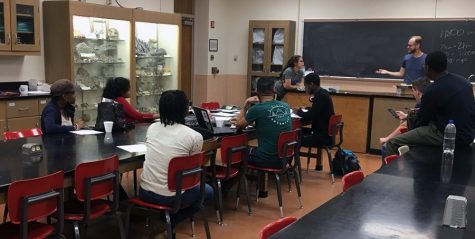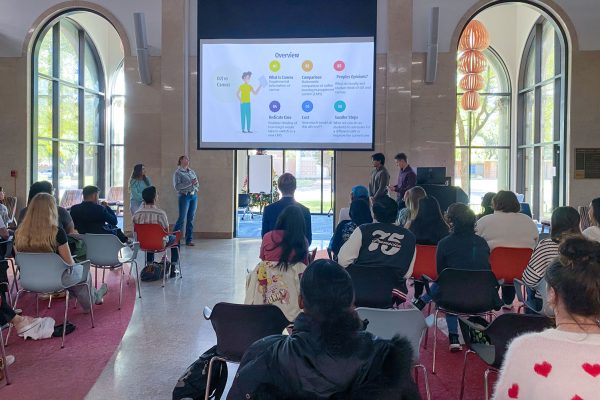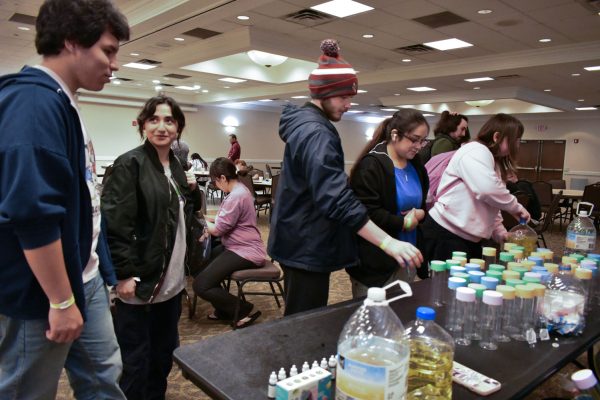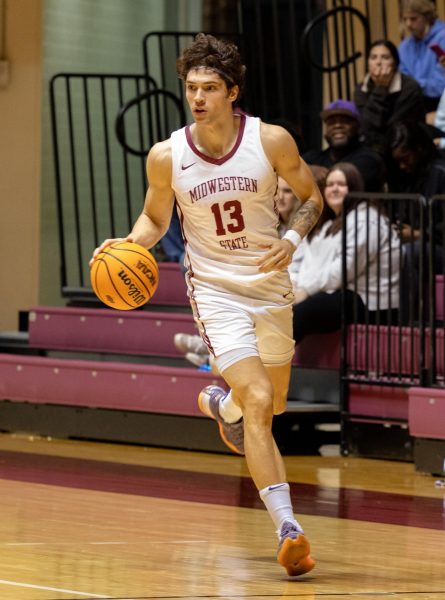Campus thriving to be more environmentally efficient
According to environmental science professors, and students on campus, Midwestern State University is not doing as much as it could be to make this campus environmentally friendly. Facility Services is open to new ideas and improvement, but sometimes the cost outweighs the benefit.

Peyton Lisenby, assistant professor of geosciences and ESO faculty adviser, assists in elections. Photo by Nick Lanier.
“My perspective on a lot of the green initiatives are great ideas in a perfect world and would work well, but the cost on them tend to be expensive,” Kyle Owen, associate vice president of facilities services, said.
Being environmentally efficient has multiple benefits. Being self aware of the ways energy conservation and recycling works is important.
Peyton Lisenby, assistant professor of geosciences said, “How much do we enjoy our environment? Do you like landscape? So you like looking at rivers or mountains. Or does it bother you to see land degradation, soil loss, and things like that? A lot of those questions people never consider. As students at a university, its really a good time to where you just start to consider that as you’re developing professionally, and in the learning community.”
The university’s facility services department, has been making small efforts to be more “green” every year, little by little. They consciously monitor the environmental impact. Owen said, after his 12 years of being here, they’ve tried to cut down “utility cost” in small amounts every year and they have to report to the state every November.
“You know all the concepts like sustainability, efficient use of resources, being aware of native plant types, and integrated pest management, especially what we do in grounds those are some of the things we try to undertake. We’re mostly a management, or mostly a maintenance type crew. So when we consider our grounds we try to be mindful of techniques that observe sustainability. When I think sustainability, I think maximum productive environmental benefit, with minimum inputs, or resources. Even with our most minor decisions, such as a flower bed on a corner, we try to keep in mind a portion of that perspective,” Jason Cooper, grounds foreperson said.
On campus there’s an Environmental Student Organization. William Scott Meddaugh, geosciences professor said that the ESO can help provide good insight on what happens on campus. They help facilitate ways to make our campus environmentally efficient.
“As far as I’m aware, from the time that I’ve been here, and as I kind of fulfill my role as the Environmental Science component in the geoscience department. So I have some experience with the ESO, and one of their goals is to come up with, initiate, and educate, on environmental, or green initiatives on campus. So for instance, they may spread awareness of our recycling opportunities on campus,” Lisenby said.
Being green, or environmentally efficient, can mean many things. It can mean recycling, or making oneself aware of their surroundings while considering how it affects the balance of things.
“Based on my experience in the environmental sciences, my first thought is the difficulty in defining what green is. It’s a common buzz word, but in truth there is a pretty broad array of definitions you could apply to it. Whether it’s just taking initiatives that are seen commonly as environmentally friendly. Whether that may be recycling or education initiatives about environmental impact,” Lisenby said. “More practical or applied issues would be changing the university policy to where you know they have written down guidance on how they can be more efficient.”
Where Midwestern stands on their status of being “green” is difficult to say. It isn’t doing nothing, but there is definitely more to be done.
Owen said, “I think we’re in a good spot, but a lot of things, it’d be nice to have more. Over my career here it’s not unusual for there to be students initiatives. Like coming around and putting blue trash cans in offices. [Then] coming around once a week, and dumping them. After a few years those people graduate, and now I have a blue trash can with no place to put it. That can be an issue with student led initiatives, cause it kinda dies out when the people that are pushing it graduate.”
The school is not putting forward it’s best effort to teach and encourage students on environmental efficiency. There is not enough signage, and publicity for environmental awareness on campus according to professors and students.
“I certainly see from the ESO that they’re keen to increase awareness. I think our students that lead these, are keen to increase awareness, educate about recycling opportunities, and things like that. … [Sometimes] progress made in one area may yield the opposite in another area,” Lisenby said.
There are many things that could be improved. The campus and the students always have opportunity to do more.
Lisenby said “Always the best first step is about increasing awareness. Just getting people thinking about how they interact with their environment, and ultimately how they consume their environment. Whether that is directly through whatever, such as using paper, or leaving the lights on. Also based on how much energy we use, and how much do we take for granted in terms of urban expansion?”
Recycling dumpsters for students living on campus can be found outside, in between McCullough Trigg Hall and Legacy Dorms. There are recycling bins located inside the Clark Student Center, and the buildings the classes are held in.
“We have orange recycling dumpsters that the university facilitates. So using those to the max would be an easy way to really take advantage of an opportunity, that is already there. You know the university provides these recycling stations, so recycle away. That is just one example, but students have to know it’s there.”
There is a main consensus on how to make environmental efficiency more popular. That is more publicity. Making it known to the students that there are opportunities and an organization on campus to participate in.
Meddaugh said, “It needs more publicity. What we’re doing, and what there is to do.”
Being environmentally efficient can affect students, and everyone else, in many ways.
Markell Braxton, ESO Senator said, “It affects them in their everyday lives.You can look in many aspects. First of all, like their classroom setting. You’re using paper in the classroom setting. A better alternative would be for them to use more technology, on their computer or laptops. That’s just one example.”
It’s important to consider the role that people, especially students, play in the community, and how to make the best efforts to be “green”.







